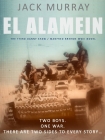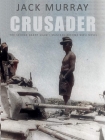El Alamein by Jack Murray (spanish books to read .TXT) 📗

- Author: Jack Murray
Book online «El Alamein by Jack Murray (spanish books to read .TXT) 📗». Author Jack Murray
They were soon joined by Sergeant Gray who accepted a mug of tea from Evans with the hint of a nod. He sat down. Nobody said anything. Something on Gray’s face suggested a man torn between anger and worry. He drained the cup in a single gulp. It was clear that the news was not good. Danny held his breath and watched the sergeant wipe his mouth with his sleeve. Then he looked round at the group.
‘So there’s bad news and very bad news. Take your pick.’
Silence.
‘Very well. The bad news is we’ve lost our reserve of fuel and water. We have what we’re carrying.’
‘Isn’t that enough? We can’t be more than half a day’s travel from Agedabia even allowing for looping around wide,’ pointed out Buller.
Gray smiled grimly and shook his head. Danny interjected at this point.
‘Is the really bad news, sarge, that our boys are no longer there?’
‘Correct, Shaw,’ said Gray. ‘They’re no longer there.’
‘What happened?’ asked Danny trying not to sound alarmed.
4
Antelat, Libya: 22nd January 1942
Mid-afternoon Kummel finally ordered a halt to the battalion. He could see the crew were badly in need of a break. They’d been on the road since morning and covered over one hundred kilometres.
‘The British can wait until I’ve had a coffee,’ said Kummel dusting half a desert from his uniform.
‘I need something more than that,’ added Beer rushing quickly to the hatch.
‘Perhaps if we could point his ass at the British, we could end this war at a stroke,’ shouted Manfred to the departing gunner. He waved his hand in front of his nose. ‘Who knew the smell of petrol would be a break from a human being.’
The others laughed in sympathy. The humour to be extracted from one man’s flatulence was an ongoing source of release. The increasing frequency and virulence of Beer’s expulsion of unwanted gastric gas had eroded any sympathy they had for the Berliner’s extraordinary capacity to create, store then expel the, olfactorily, deadly combination of methane, carbon dioxide and hydrogen sulphide.
‘And don’t come back,’ shouted Manfred which brought a round of applause from Siefers and Hubbuch while Kummel merely chuckled.
Thirty minutes later they were on the move again. During this time, they had refuelled and taken on some fresh supplies of food and water. They were past Agedabia and heading for Antelat, a town further on up Via Balbia, gradually moving north east on a path that would take them back near Tobruk. The whole of the 15th and 21st Panzer divisions were on the move. Past Agedabia, Manfred noticed that the pace was faster now. Congestion had slowed progress throughout the last two days as the vehicles bunched through bottleneck gaps in the mines left over from the December offensive. The voice of Colonel Cramer on the radio put an end to their break; soon they were on the road again.
‘1st Battalion has been assigned to a Battle Group,’ said the colonel. ‘In their wisdom they’ve called it Battle Group Cramer. Rather inspiring, I think. Maybe they’ll write an opera about us one day. We’re to engage the British armoured formations in Saunnu. To save you consulting your maps, that is thirty kilometres east of Antelat. They want us to destroy them. I think we can do that, don’t you?’
Kummel smiled and nodded down to Hubbuch. The Battle Group veered off Via Balbia in a wide arc.
‘It sounds like he wants us to surround the British forces within the area,’ said Kummel by way of explanation to the crew.
‘That was my guess, too,’ said Beer, earning a light clip round the head from his captain.
As the light was beginning to fade, Manfred’s hopes grew that they would get through the day without seeing the enemy or being seen. It had been a long march and he suspected it just might continue through the night. Kummel grabbed his binoculars. This meant he intended sitting outside the cupola of the tank. They continued on in silence for another twenty minutes then Manfred heard it.
‘Enemy tanks in front of us,’ said Kummel.
A voice crackled a voice on the radio. It was Cramer.
‘How many do you see?
“It’s difficult to say; at least a company,’ said Kummel simply. ‘They are directly ahead to the east of the road to Giof el Mater.’
‘How far?’ pressed Cramer.
‘Three, maybe four kilometres,’ replied Kummel. ‘4th Company attack frontally. All others turn towards Giof el Mater. We must take the airfield.’
Lieutenant Stiefelmayer replied immediately, ‘Engaging.’
The radio went quiet. Manfred found his heart racing. No one spoke in the tank. All were waiting to hear what the 4th Company encountered.
The next few minutes flew by in seconds. One moment Manfred could hear the crump of tank guns from both sides. The next he heard Kummel calmly announce that he’d seen anti-tank guns.
‘Range six hundred metres, twelve o’clock. Armour-piercing shell.’
Manfred was already loading it into the breech.
Kummel ducked his head back into the turret. He put his mouth to the mic, ‘Companies one and two, frontal assault. Three, work your way around to the west, and take the guns from that side. We’ll swing round from the east. Oh and Beer…’
‘Yes, sir?’ said Beer looking up at the captain.
‘You can start firing.’
A grin broke out over Beer’s face, ‘Yes, sir’. He put his eyes on the sights and his thumb over the button.
The fighting resumed once more. An unequal fight that did not last long. The British were sent in headlong retreat.
-
The next morning began, as it usually did for Manfred, around five thirty. He had just about enough time to shave when he saw the others in his crew beginning to stir. Even Kummel was still sleeping when the smell of coffee woke him.
‘Is the war over yet?’ asked Kummel,





Comments (0)